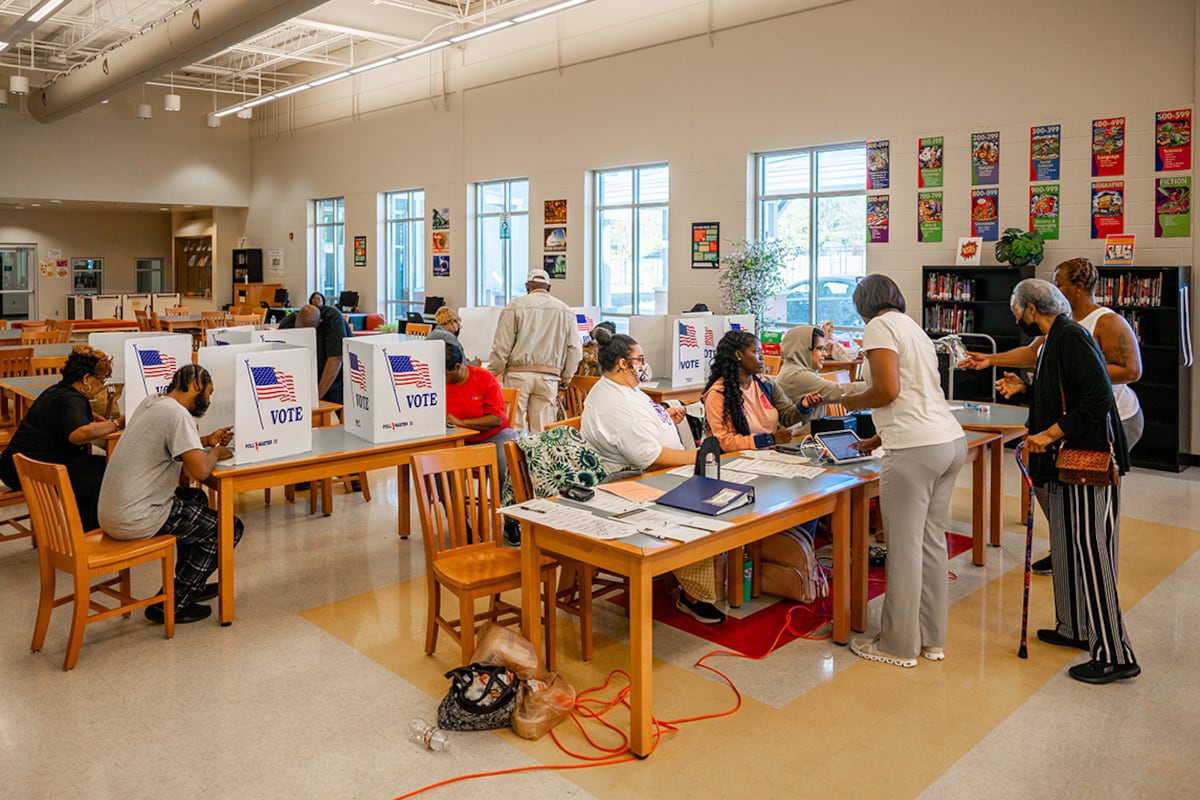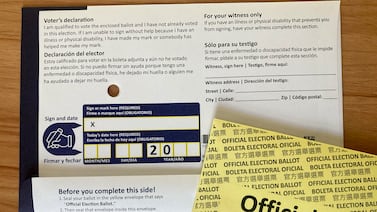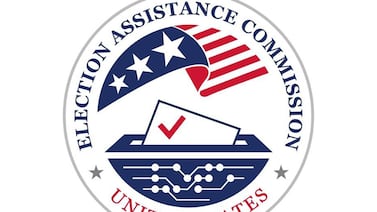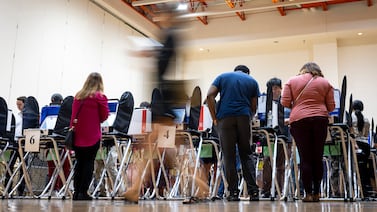Votebeat is a nonprofit news organization reporting on voting access and election administration across the U.S. A version of this post was originally distributed in Votebeat’s free weekly newsletter. Sign up to get it delivered to your inbox every Saturday.
The 2023 off-cycle election has concluded and it was, on balance, a smooth success. Turnout was high where it was expected to be, and low where it was expected to be, and by and large, administrators were prepared. There was a scattering of snafus and incidents, most of which were resolved without further issue.
There was, as is often the case, a glaring exception to the untroubled proceedings: Hinds County, Mississippi.
Hinds County is home to Jackson, a predominantly Democratic and Black city, which has had more than its share of adversity shoveled its way in recent years. And throughout that county, precincts repeatedly ran out of ballots. Polls open at 7 a.m. and at least one precinct — McLeod Elementary in North Jackson — was out of ballots before 9 a.m. Ultimately eight others (out of a total of 110 voting precincts) would also run out of ballots. Lines were up to two hours long in some places, and some voters simply left altogether as the county responded by delivering small batches of more ballots throughout the day.
Sure, turnout was high. But it was expected to be. The state has been the setting of a surprisingly competitive gubernatorial race.
Still, initial returns do not suggest to me that Hinds County’s turnout in 2023 — around 65,000 votes cast for governor — was significantly higher than the 2019 election of the same type, where more than 70,000 votes were cast.
The early numbers make explanations by local officials seem at least incomplete.
In an interview with local station WLBT, Hinds County District 5 Election Commissioner Shirley Varando blamed “unexpectedly large turnout as the problem.” “We’re running ballots as we speak because we’re trying to make sure every voter gets a chance to come out and cast their ballot for the people of their choice,” she said.
“I believe that the secretary of state’s office and county elections office were simply not prepared for the overwhelming, amazing turnout we are seeing in Hinds County. We are not seeing any of these issues in any other precincts in any other counties, to this degree,” Jason McCarty, a member of the Hinds County Democratic Party Executive Committee, told CNN.
According to local station WAPT, “District 2 Election Commissioner RaToya McGee said there were enough ballots delivered for 70% of voters in each precinct. McGee said some poll managers didn’t pull out all of the ballots they were supplied before calling to ask for more.”
State law requires the counties to have ballots for 60 percent of total active voters, and gives local officials discretion over how they are distributed.
There are just more than 165,000 active voters in the county, which suggests — if McGee is right — that there should have been about 115,000 ballots to go around. Of course, stocking ballots is not a simple matter of distributing them equally across the county. It is far more complicated, and any election administrator could tell you so: Ballots must be apportioned by precincts and language, among other things. A whole number won’t tell you much, but no one is responding to my requests for a more detailed explanation.
We don’t yet know a lot about what happened in Hinds County on Tuesday, but Secretary of State Michael Watson offered 2020 redistricting as a factor in an interview with Mississippi Today. The new maps changed precinct lines and also split precincts in new ways.
“They might have 10 people at the precinct who get one ballot style, and then 50 who get another ballot,” Watson said. “I think in some cases, this got flipped, and they ended up with 10 of one type when they needed 50. We were getting calls throughout the day about problems in Hinds, and we then learned there were several lawsuits being prepared.”
If he’s right, that’s… not great. And it’s something thousands of other election administrators across the country get right, regardless of how the precinct lines move. We’ll see what shakes out in the end, but, whichever way you slice it, it’s a huge misstep (or rather, series of missteps) on the part of the Hinds County election commission — a five-person committee made up entirely of elected Democrats.
For their part, Watson and his office were quick to point out that the secretary of state has little control over the decision making of the counties in the state, and did not respond to an inquiry from Votebeat about its authority to respond to the failures now that they’ve occurred.
Now, let’s talk about why Mississippi elections don’t get as much attention as other states, even though local reporters have knocked themselves out covering issues there. News reports and public acknowledgement of the ballot shortages began to trickle out Tuesday afternoon, though the problems had started several hours earlier. If this were a county in a swingier state than Mississippi, we all would have known about it immediately and Hinds County would have been forced to offer a more fulsome explanation.
It took me the better part of a day to find one person from a national advocacy organization that had been on the ground in Jackson. Ultimately, through multiple layers of contacts and one accident, I found two. Had it been any similarly-sized county in any swing state, I bet it would have taken a matter of minutes to find contact information for a half-dozen.
Not so in Mississippi.
Debbie Pantenburg, who manages communications for the League of Women Voters Mississippi, said that she can “only surmise” the votes lost as voters left the lines in Hinds County “likely would not have made a bit of difference in the state elections,” though they may have had an effect on local races.*
“[Hinds County] is one of the most underrepresented in the history of the state, and this just contributes to their voter fatigue,” she said. “Someone didn’t do their jobs.”
Paloma Wu — deputy director of impact litigation at the Mississippi Center for Justice, which represented Mississippi Votes in one of the lawsuits to keep polls open in the county — acknowledged that reaction has been “quieter than you would expect for such a big failure.”
She agrees it’s because Hinds County isn’t competitive.
Will it ever be thus? Even though voting rights and access to the ballot box is the issue du jour, there are clearly still big problems in this country that aren’t investigated with the thoroughness they deserve because the voters affected by them do not live in a politically critical place.
Maybe it’s time we all looked hard at that.
Back Then
This isn’t the first time Hinds County has been short on ballots:
“The Hinds County Board of Supervisors asked county attorneys Monday to investigate the actions of Hinds County Election Commission Chairwoman Connie Cochran after she admitted to not ordering the number of ballots required by law for any of the past four countywide elections,” reported the Clarion Ledger on Nov. 19, 2014. Defending her actions, Cochran said she was “just trying to save the county money.”
Cochran left county office in 2016 after losing re-election.
New From Votebeat
From Votebeat Arizona: Two new Arizona laws would create regular checks on voter citizenship. Will a judge let them stand?
From Votebeat Arizona: Early closing times for some Maricopa County drop boxes frustrate last-minute voters
From Votebeat Pennsylvania: Voting machines in Northampton County printed ballots with errors in two judicial races
From Votebeat Pennsylvania: “Hectic from the get-go”: How a new polling place chief in Pennsylvania navigated his first election.
From Votebeat Michigan: Low turnout but smooth sailing for Michigan’s first foray into early voting
In Other Voting News
- The Minnesota Supreme Court dismissed an effort to ban former President Donald Trump from the state’s primary ballot under the 14th Amendment, which renders anyone who “engaged in insurrection” from holding office, ruling that political parties control which candidates are eligible for the primary ballot, but left open the possibility of a similar lawsuit succeeding in keeping him off the general election ballot, the Associated Press reported.
- The Cybersecurity and Infrastructure Security Agency, which works with election officials around the country to protect against physical and virtual threats to elections, said this year’s elections ran smoothly and they saw no major threats.
- Election offices in five states — Georgia, Nevada, California, Oregon, and Washington — received suspicious mail including a powdery substance, some of which contained fentanyl, the Associated Press reported. The FBI and U.S. Postal Inspection Service are investigating. Secretary of State Steve Hobbs called the incidents “acts of terrorism” meant to undermine elections, and Georgia officials said they were providing the naloxone, a drug to reverse overdoses, to Fulton County elections officials as a precaution.
- Former President Donald Trump is pressuring Wisconsin Assembly Speaker Robin Vos to impeach Meagan Wolfe, the nonpartisan head of elections in the state, something Vos has so far declined to do, the Journal Sentinel reported.
- A judge upheld the results of the 2022 election in Harris County, Texas, ruling against a Republican candidate in a judicial race who said thousands of voters had been unable to cast ballots because of a ballot paper shortage affecting some polling places, the Houston Chronicle reported. The judge found Harris County election officials made many mistakes, but not enough to invalidate the election, and he also threw out all but one of 21 remaining election contests challenging the results.
Correction, Nov. 15: This article originally misspelled Debbie Pantenburg’s name.
Jessica Huseman is Votebeat’s editorial director and is based in Dallas. Contact Jessica at jhuseman@votebeat.org.








